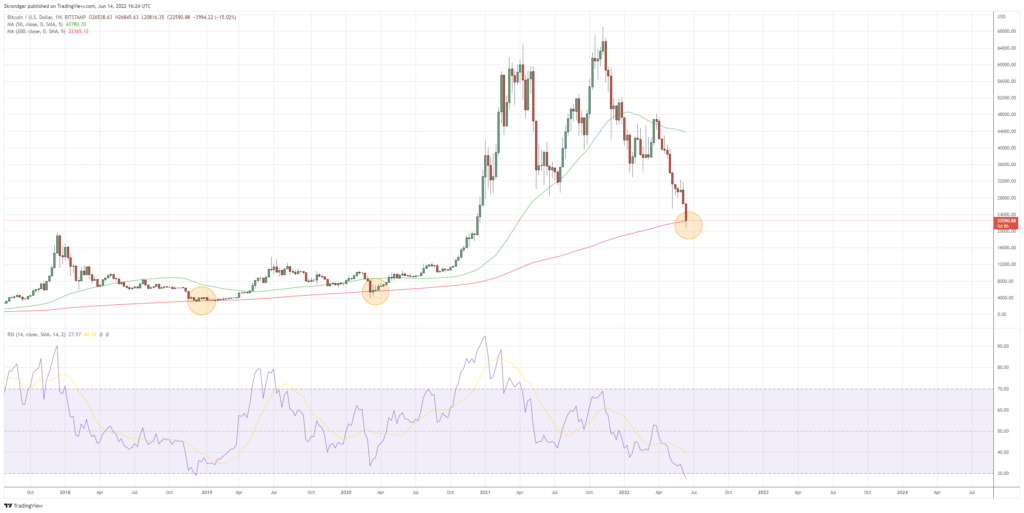- Bitcoin has experienced a massive price slump in the last 48 hours.
- Historically, these very moments have repeatedly proven to be favorable opportunities to buy Bitcoin.
- However, in the face of an impending recession, an investment seems riskier than in previous years.
The Bitcoin price is quoted in a range that was last visited in December 2020 or early 2021. There is currently a risk in the market that has never been seen before. Because if the global economy were to slide into a major recession, then Bitcoin would have to assert itself in such a situation for the first time.
Even worse are the current effects of the possible collapse of the Celsius Network and the expected interest rate hikes by the Fed are also exerting enormous pressure on the market. In the worst case, Bitcoin could even fall below the all-time high from 2017 and thus be trading south of the $ 20,000 mark.
In short, the current situation is already very bad, but it could get much worse. And this is exactly what gives reason for hope, because in the past, an acyclic investment has often paid off in the long run.
Indicators are favorable
Although we cannot assume that the past will have to repeat itself, similar scenarios can have a similar outcome. For example, the weekly chart shows that the line of the 200 Moving Average has been touched twice in a crash.
The first time was between the end of 2018 and the first quarter of 2019, when a bottoming out occurred after the bear market. After that, a similar situation occurred in March 2020, when it became clear to the world that COVID-19 would have a massive impact on the global economy. Currently, Bitcoin is in the same place in the charts for the third time.

At the same time, it turns out that the RSI has reached a low, which was last observed in 2015. The sell-off is therefore very violent and offers a great opportunity for risk-taking speculators to acquire Bitcoin on the spot market.
The price may fall even lower
Although the indicators speak for a favorable opportunity from a technical point of view, from a fundamental point of view, it has never looked worse. The current situation underlines that Bitcoin is not an “inflation hedge”.
Inflation is rising, it currently remains at about 19 million BTC, but the price is going into the basement. Depending on what the Fed will decide in the face of a new inflation record, this can have a violent impact on the market. Ultimately, for the time being, it has no choice but to take measures that will cause the markets to melt down. So if Bitcoin does not find support between $ 20,000 and $ 22,500, then the market could collapse completely. A suitable catalyst for such a disaster would be the Celsius Network, which in the event of a bankruptcy has to throw a lot of cryptos on the market and including Bitcoin.
Dollar-cost-average as a popular strategy
One way to take advantage of the current situation and better mitigate any risks is to take advantage of the so-called average cost effect. Investors buy small amounts at fixed times over months or even years.
After all, almost every stock or ETF savings plan is based on this. If you apply this strategy to Bitcoin, then you should take into account, given the current situation, that the price may still have to go through a deep valley of tears. Therefore, it is advisable to use the capital very sparingly, because the strategy only works if you are able to buy again permanently, no matter how low the price still falls. Given the risks in the market, this could be deeper than many people would like.
The articles published on our website reflect the personal opinion of the editors and their personal assessment of the market situation. They do not constitute investment advice or recommendations. All publications are for information purposes only. They are not adapted to your individual situation and cannot and should not replace personal and qualified investment advice with qualified advisors. Trading cryptocurrencies is always a risk. If you use the information offered here or follow advice, you act on your own responsibility.









